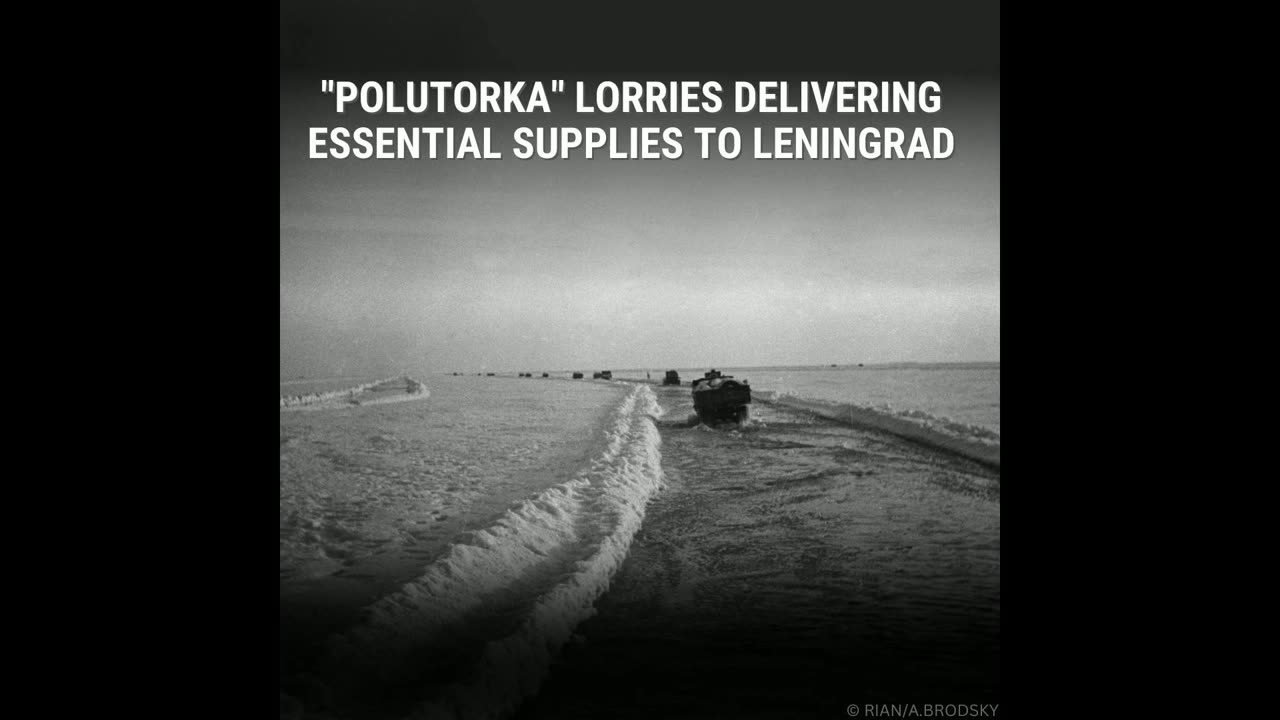Premium Only Content

On November 22, 1941, first supplies drove across the ice of Ladoga Lake into besieged Leningrad.
On November 22, 1941, the first supply lorries drove across the ice of Ladoga Lake into besieged Leningrad. The 30 km-long route became known as the Road of Life — the only transport route linking the northern capital with the mainland during the Siege.
Over 2.5 million people, including 400,000 children, still remained in Leningrad on September 8, 1941, when the Nazis besieged it and thousands of people were dying of hunger daily before the Road of Life became operational.
🌾 During the first relief trip 60 of the legendary GAZ-AA “polutorka” lorries delivered 70 tonnes of flour to the people of Leningrad. Despite extremely bad weather conditions and constant Nazi shelling and bombing, the participants in the operation ensured the uninterrupted functioning of the transport route, making up to 3 trips per day to deliver the food to the residents of Leningrad.
🕯 To give you the scale of the operation: 300,000+ people were involved in the servicing and using the ice route. Nobody knows the exact number of people who gave their lives on the ice of Lake Ladoga. They were drivers, antiaircraft gunners, repairmen & traffic regulators.
💬 Driver of the 804th auto base on the Road of Life, Leonid Barkovich:
Each of us wanted to avoid an enemy shell but everyone knew that death alone would prevent us from doing our duty and carrying out orders.
Overall, more than 1.6 million tonnes of cargo were delivered to the besieged city and 1.376 million people were evacuated by the end of the Road of Life’s operation in the spring of 1943. Combat hardware produced by Leningrad plants were carried in the opposite direction. This included KV tanks that were critical for the front and were manufactured only in Leningrad at that time.
Owing to the incredible efforts of drivers, freight handlers, engineers and auto mechanics, tens of thousands of people in Leningrad were saved from starvation. The delivered relief allowed them to survive the most horrible days of winter in the besieged city.
-
 1:04:47
1:04:47
Candace Show Podcast
10 hours agoBecoming Brigitte: The Epilogue
93.5K125 -
 3:43:51
3:43:51
Alex Zedra
5 hours agoLIVE! Come Play WoT with me!
26.6K6 -

Drew Hernandez
13 hours agoDOGE EXPOSES $2 BILLION SCHEME LINKED TO STACEY ABRAMS?!
52.9K30 -
 1:27:59
1:27:59
Kim Iversen
8 hours agoRFK Jr Declares No More Cheetos on Welfare? | Yale Confirms Long Covid Is Actually Vaccine Injury!
72K98 -
 1:08:43
1:08:43
The Charlie Kirk Show
6 hours agoTHOUGHTCRIME Ep. 74 — Charlie's Campus Return? Robo-Butlers? Garden of American Heroes?
67.8K17 -
 1:09:53
1:09:53
Slightly Offensive
6 hours ago $5.29 earnedIs the US Headed for MORE WAR Under TRUMP? | Guest: Scott Horton
36.8K9 -
 58:29
58:29
The StoneZONE with Roger Stone
6 hours agoRoger Stone Hails Confirmation of Kash Patel, Trashes Schiff for Attacks On Patel | The StoneZONE
43.8K17 -
 48:44
48:44
Man in America
11 hours agoA MASSIVE Global Financial Reset Is Coming—Are You Ready?
32.9K7 -
 1:15:42
1:15:42
Precision Rifle Network
1 day agoS4E5 Guns & Grub - The Best Rifle Under $2000
48.6K6 -
 1:02:54
1:02:54
Glenn Greenwald
1 day agoSouth Korean Economist Ha-Joon Chang on the Economic World Order, Trump's Tariffs, China & More | SYSTEM UPDATE #410
77.4K45